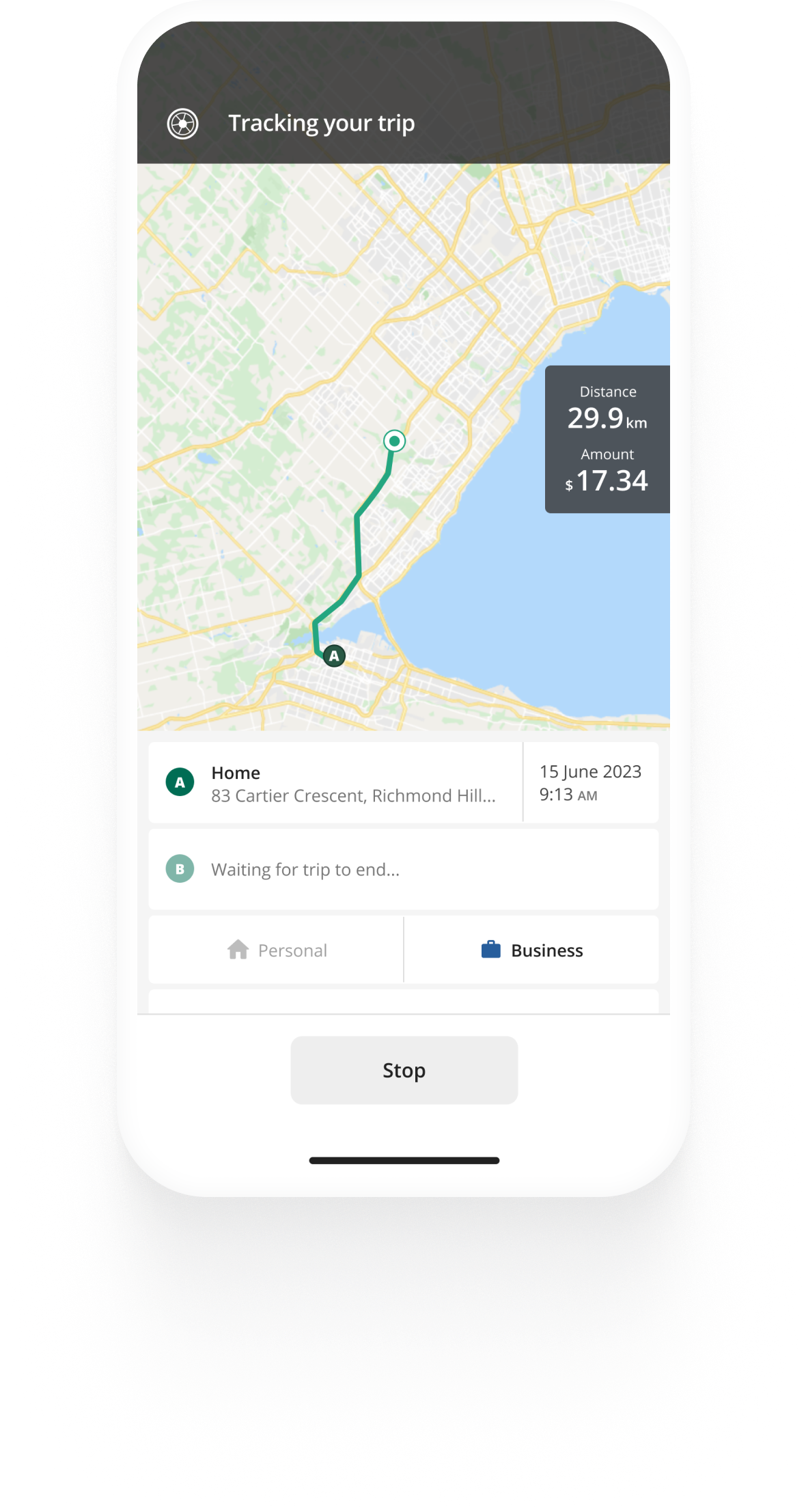Track mileage automatically
Get startedClaiming Vehicle Expenses from the CRA as Self-Employed
In this article, we'll go through the rules on how to deduct your business-related vehicle expenses from your tax as a self-employed person in Canada, and explain how to calculate and keep track of tax-deductible mileage and other related car expenses.
If you're an employer and want to know the rules for reimbursing your employees, or an employee looking for a how-to on mileage reimbursement, you can instead check out our respective guides for employees and employers.
You must keep separate records for each activity if you are both self-employed and employed. If that's the case, we recommend reading both manuals.
In either case you will need to keep a meticulous mileage log book. With the Driversnote mileage tracking app you can have mulitple workplaces and create separate reports for them. That way every business kilometer you drive is properly documented.
General rules for self-employed mileage deductions in Canada
As self-employed, you can deduct vehicle expenses accrued while driving for business. You cannot make use of a standard mileage rate or allowance. Instead, you can deduct expenses associated with operating your vehicle while you use it for business, meaning you will have to factor our any private use. Some examples of business-related driving include:
- Meeting clients and attending conferences
- Purchasing supplies your business needs to operate
- Running errands for your business
- Visiting customers
Claiming Capital Cost Allowance, leasing and interest for your vehicle
The CRA defines four main types of vehicles for the purpose of Capital Cost Allowance (CCA), interest and leasing deductions:
- motor vehicles
- passenger vehicles
- zero-emission passenger vehicle (ZEPV)
- zero-emission vehicle (ZEV)
Learn about the rules on how your vehicle is defined.
We will soon have an article all about claiming CCA, interest and leasing deductions for self-employed.


Track business driving with ease
Trusted by millions of drivers
Automate your logbook Automate your logbook
Records you need to keep for your self-employed mileage deduction
There are two methods for claiming vehicle expenses from the CRA - the full logbook method and the simplified logbook method. As the names suggest, you will need to keep a log book of your driving. You will also need to keep all receipts and invoices of car-related expenses throughout the year.
Your logbook must contain
- the total distance you’ve driven during the year
- odometer readings from the start and end of the year
- a breakdown of your car’s business vs personal use
For each business trip you should log the following:
- The date
- Purpose of the trip
- Destination
- Kilometres traveled
Receipts and invoices
Motor vehicle expenses can only be deducted if they are reasonable and if you have receipts to back them up. According to the CRA, deductible expenses include:
- Licence & registration costs
- Fuel & oil
- Electricity (for zero-emission vehicles)
- Insurance
- Maintenance & repairs
- Leasing costs
- Interest on money borrowed to buy the motor vehicle
With the full logbook method, you have to keep a logbook of your driving every year, as well as all receipts for your car expenses.
With the simplified logbook method, you need to log a year’s worth of mileage to establish a base year. After that, you can use a 3-month sample each year to determine the deduction for vehicle expenses you can claim at tax time so long as it is within 10% of the base year’s business use percentage. You still need to keep all receipts for car expenses each year.
How to calculate the vehicle expenses you can claim from the CRA
Knowing the portion of business use of your personal vehicle will help you figure out how much you can claim for depreciation and other costs of operating that vehicle. Let's look at one quick example:
You've driven ten personal trips, each of which was 20 km. This totals 200 personal km (10*20 = 200).
You've also driven three work journeys totalling 200 business kilometres throughout the same time period.
Divide your business kilometres by the total number of kilometres driven to determine the business use of your personal vehicle. In our example, you've used your car for business 50% of the time.
200 personal km / 400 total km = 0.5
Calculating your total mileage deduction from here is simple: Multiply your car-related expenses by the share of business kilometres. For example, if you had $500 of expenses, multiply that by the share of business kilometres (0.5) - the vehicle expenses you can deduct are $250.
See more examples of how to calculate your CRA mileage claim by both methods in our guide on how to calculate your mileage claim.
You need to keep your records at hand
The CRA requires that you keep records of any mileage deductions that you are claiming for six years from the date you submit your tax return. This is to ensure that if they ask you to give evidence to back up your tax claims, you will have everything ready and available.
FAQ
How to automate your mileage logbook
CRA Mileage Guide
- For Self-Employed
- For Employees
- For Employers
- Mileage Logbook Requirements
- How To Calculate Your Reimbursement
- Is Car Allowance Taxable?
- Claim Motor Vehicle Expenses In 5 Steps
- Mileage Rates For 2024 And Previous Years
- Current CRA Mileage Rates
- CRA Mileage Rates 2022
- CRA Mileage Rates 2021